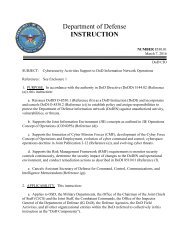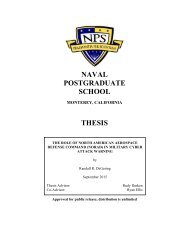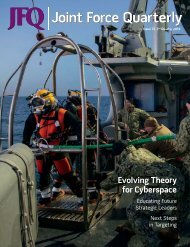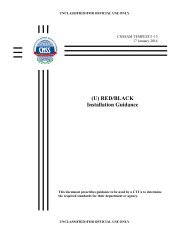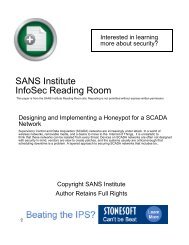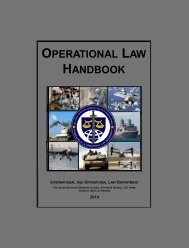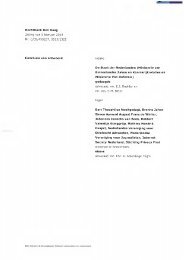jko-catalog-sep-2012
jko-catalog-sep-2012
jko-catalog-sep-2012
Create successful ePaper yourself
Turn your PDF publications into a flip-book with our unique Google optimized e-Paper software.
JKO Course Descriptions<br />
lar Warfare (IW) curriculum, this course will provide relevant training to staff and individual augmentees who cannot attend<br />
formal Joint Professional Military Education courses or training exercises. Its intended audience includes military, civilian, and<br />
multinational planners and operators preparing for deployment. Topics include Department of Defense policy and strategy and<br />
the military strategic approach and objectives for countering terrorism; terrorists and their organization and approaches; counterterrorism<br />
operational approaches; command and control roles and considerations; and significant counterterrorism enabling<br />
functions. 6 hour(s)<br />
Course of Action Development, Analysis, Comparison, and Approval (HOA 11) Course J3OP-US878 N,S<br />
The purpose of this course is to train Individual Augmentees (IAs) assigned to the CJTF-HOA staff who were unable to participate<br />
in the formal in-house training at JWFC as part of the core staff. The student will become familiar with aspects of the Joint<br />
Operation Planning Process. At the conclusion of the course, the student will be able to understand and describe Course of<br />
Action development, analysis and wargaming, comparison, and approval. The student will understand that commander’s guidance<br />
drives Course of Action development, Course of Action Analysis identifies advantages and disadvantages of each friendly<br />
Course of Action, wargaming is key to Course of Action analysis, and Course of Action comparison assists the commander in<br />
identifying and selecting the best Course of Action. This course is derived from the US Joint Forces Command/Joint Warfighting<br />
Center (JWFC) Deployable Training Team academic training seminars presented to the incoming CJTF-HOA staff during<br />
the Academics phase of the Mission Rehearsal Exercise, December 2010. 1 hour(s)<br />
CPOF Operator's Introductory Course ARN-US501 N<br />
The purpose of this course is to introduce the Command Post of the Future (CPOF) workstation to new users. This course covers<br />
all of the basic functions of CPOF using highly interactive learning techniques. Users will dive into CPOF and have opportunities<br />
to sharpen their skills on a simulated CPOF environment. The course conclusion consists of a motion graphics based<br />
scenario that will test the course objectives and provide real world examples of the CPOF station at work. 2 hour(s)<br />
CPX Master Scenario Event List Development Process Course J7SN-US303 N,S<br />
The purpose of this course is to introduce a standard Master Scenario Event List Development Process for a Command Post<br />
Exercise. Other types of exercises, especially live or field training exercises, use different processes. This process has been<br />
developed over several years and has been successful in many exercises from relatively simple to highly complex. The individual<br />
Services and Geographic Combatant Commands may use processes adapted to their specific needs that are somewhat<br />
different from what is described here, but the principles are the same. 2 hour(s)<br />
Crime Prevention ARNJ7-US048 N<br />
This course details standard crime prevention procedures. Please watch the video and make note of important safety precautions.<br />
0.20 hour(s)<br />
Critical Infrastructure Awareness (CIA) Course J3ST-MN187 N,S, IP<br />
Critical Infrastructure Awareness (CIA) Course will allow students to learn about current and prospective strategic level issues<br />
related to critical infrastructure protection (CIP) and have a greater appreciation of the fundamental elements and complexity<br />
of CIP in relation to national and global security concerns. Armed with this information, you'll be in a better position to contribute<br />
to the development of plans and policies such as public safety and security, national security, emergency planning, and, for<br />
our military members, operational planning. Military commanders will also be better able to determine the weaknesses that<br />
exist within their own areas of responsibility and help guide their personnel in formulating plans to address potential critical<br />
infrastructure (CI) failures due to either natural or human causes. This knowledge will also help you to determine vulnerabilities<br />
for applications during Effects Based Operations (EBO). Implementing CIP requires the acceptance by senior management,<br />
military or otherwise, that greater cooperation between government and private owners and operators is necessary if<br />
protective measures are to be successfully implemented. This course was developed for senior civil and military personnel<br />
ranging from the Staff College Major to the War College Colonel and their civilian equivalents. 3 hour(s)<br />
Cross-Cultural Competence Trainer J3OP-US744* N,S<br />
The purpose of this course is to provide the understanding of both one’s own and other cultures is essential for the Department<br />
of Defense (DoD) as it faces the increasingly complex security challenges of the 21st century. Interaction with local populations<br />
and other cultural factors are not only critical elements in persistent conflict but contribute to the success and/or failure<br />
of stability, peacekeeping, humanitarian aid and disaster relief operations. It is imperative that we build a Total Force<br />
which is globally aware and adept at interacting with people from a variety of cultures while operating within joint, interagency,<br />
coalition and multinational contexts. Cross-Cultural Competence (3C) is emerging as an important and practicable means for<br />
enhancing the ability of units and individuals to perform successfully over the full spectrum of operations. And understanding<br />
cultural differences will contribute to mission success—just as failing to grasp cultural variations will contribute to mission failure.<br />
3 hour(s)<br />
* Indicates new courses added to the JKO LCMS after July 2011. The “*” is not a part of the actual course number.<br />
76




